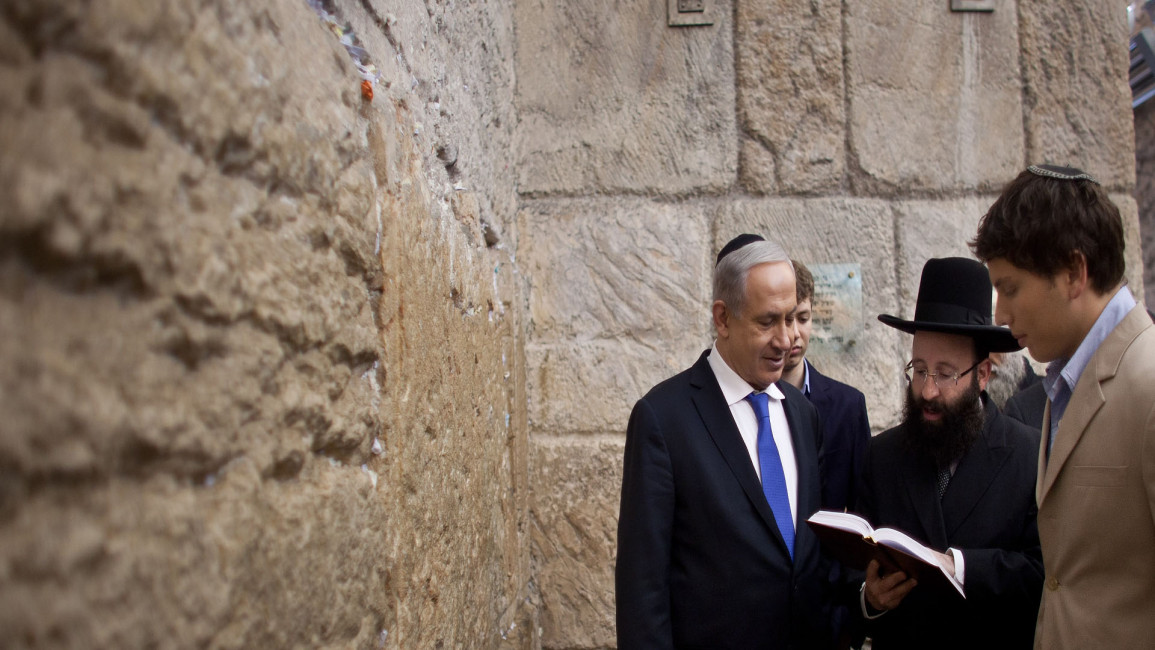
The political parallels between Netanyahu and Morsi
Many people say they are similar, and some go as far as to say that those who advocate an Islamic state are opening the way for the recognition of the legitimacy of the imminent Israeli legislation that Israel is a Jewish state.
These people are referring to so-called "political Islam", and particularly the Muslim Brotherhood. We can also see similarities between two groups supposedly in conflict for decades, Arab and Jewish nationalists. This paradox is no less outrageous than the open secret of the Arab-Zionist alliance to suppress the revolutions of the Arab Spring and their collaboration to stoke the fires of counter-revolution to finish off Arabs' last hope of emancipation from the shackles of crumbling dictatorship.
| The Brotherhood and other Islamist movements have nothing to do with any of the racist principles of the Israeli right wing. |
Diskin strongly criticised Netanyahu the day after the prime minister endorsed the controversial "Jewish state" bill. The former ISA head said there were a lot of similarities between Netanyahu's plan, which apparently privileges the "Jewish" part of the Israeli state over the democratic part and, as Diskin put it, Morsi's failed plan to impose Islam as the state religion of Egypt.
Constitutional parallels
To prove his point, Diskin cited the second article of the draft constitution proposed during Morsi's presidency, which stated that Islam was the religion of the State, Arabic was its official language and the principles of Islamic Sharia were the main source of legislation.
He said it was nearly identical to the "Jewish state" bill, which says Israel is the state of the Jewish people, Hebrew is the official language and Jewish law the source of legislation. He argued that the second article of the Egyptian constitution, like the Israeli nationality law, did not bring anything new and was moderate even in comparison with the demands of the Salafi party.
By this he was hinting that Netanyahu, like Morsi, fell under great pressure from "religious extremists" - Morsi feeling the heat from the Salafi movement, and Netanyahu with the messianic right-wing parties such as Jewish Home.
He also said the Brotherhood shared the same characteristics as the religious parties in Israel, the most prominent of which were represented by article 219 of the draft Egyptian constitution, which reads: "The principles of Islamic Sharia include the general evidence and jurisprudence rules and recognised sources as acknowledged by the Sunni schools of thought."
Diskin said the debate over Morsi's proposed constitution led to his fall from power, and hinted that Netanyahu may suffer a similar fate.
"Many Egyptian intellectuals said these things would not promote equal rights but rather the complete opposite," he said, noting that this was how many Israelis felt about the Jewish state bill.
It is somewhat unfair in moral terms to compare the two groups because the Brotherhood and the other Islamist movements have nothing to do with any of the racist principles on which the Israeli right wing is based, and do not have the same history of killing, massacres, ethnic cleansing or hostility that dominates the thinking of the right.
The Israelis also created the idea of Zionism based on occupying a land and displacing the people, alleging it was a land without a people.
Ostentatiously religious
| Netanyahu may find himself removed from power by the power of the ballot box, a political device increasingly irrelevant in many Arab countries. |
We might understand Diskin's comparisons in the context of the political debate and partisan bickering underway in Israel, because of the bitter struggle between parties and political forces there.
However, in reality, it points to an issue that has preoccupied and continues to preoccupy elites interested in Islamic political movements - and that is the religious flavour these movements insist on adopting in their internal structures and basic laws, so much so that they cease to be pragmatic political parties and are transformed into ideological ones. That is why they face such hostility and provocation from forces opposed to dismantling Arab dictatorships.
These movements could have had programmes that include all the ethics and values they wanted to embody without directly stating their Islamic identity, much as Erdogan has done in Turkey.
At this point we might recall the Jewish state bill and the objections raised against it across the political spectrum, on the grounds that it does not add anything new either to Jewish identity or the racist nature of the state - because Israel already applies the same policies in the bill but without justification acceptable under international law.
This invites harsh criticism from the international community and has given new momentum to the movement to "delegitimise" the Jewish state.
Netanyahu, who has had indirect communication with Hamas and made truces and ceasefires with the movement, will not face the same fate as Morsi. In the Israeli system there are no military coups, no Hollywood-style million man marches and no army that abandons its military duties to pursue its own people on university campuses.
However, Netanyahu may find himself removed from power by the power of the ballot box, a political device increasingly irrelevant in many Arab countries.
Opinions expressed in this article remain those of the original author and do not necessarily reflect the opinions of al-Araby al-Jadeed, its editorial board or staff.
This is an edited translation from our Arabic edition.



